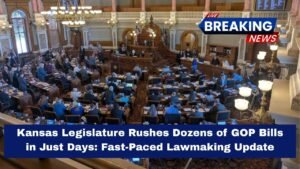Oklahoma State Superintendent Ryan Walters has ordered all public school districts in the state to provide free cafeteria meals to every student, while also banning certain processed foods and artificial ingredients.
The directive, issued Monday, has drawn sharp criticism from education leaders and advocacy groups over concerns about legal authority, funding gaps, and implementation feasibility.
Superintendent Issues Statewide Meal Mandate
Under the new directive, Walters is requiring all Oklahoma public schools to adjust their budgets to provide no-cost breakfast and lunch for every student. He claimed that existing state and federal education funds are sufficient, suggesting schools could redirect money by reducing administrative salaries.
“We need fewer administrators and more investment in students,” Walters said, arguing that funds are being tied up in what he described as education bureaucracy.
Threats of Sanctions Spark Legal Concerns
Walters also warned districts that non-compliance could lead to audits, funding cuts, or accreditation penalties—actions the Oklahoma State School Boards Association (OSSBA) argues may exceed his legal authority.
“Local school boards have full control over district budgets,” said OSSBA Executive Director Shawn Hime. He emphasized that while some schools voluntarily use discretionary funds to cover meal costs, this remains a local decision, not a state mandate.
New Nutrition Standards Also Enforced
Alongside free meals, the mandate imposes new nutritional restrictions on school cafeterias. Walters has banned ultra-processed foods, sugary beverages, processed meats, and seed oils such as corn, canola, cottonseed, grapeseed, and soy.
Additionally, schools are prohibited from using food dyes like Red 40, Yellow 5 and 6, and Blue 1 and 2.
Walters also instructed schools to avoid food grown with glyphosate, a common agricultural herbicide. These changes align with a recent executive order by Gov. Kevin Stitt, which asked state agencies to evaluate and reduce the use of artificial dyes in school meals. However, the Governor’s Office has not commented on Walters’ broader mandate.
Funding and Participation Discrepancies
According to the Oklahoma Department of Education, families spent $42 million on school meals last year, while administrative salaries reportedly rose by 14%—though the agency hasn’t cited sources for either figure.
Chris Bernard, CEO of Hunger Free Oklahoma, said Walters’ plan lacks financial feasibility.
“No other state has implemented universal free meals without allocating additional funding,” Bernard said. “There’s no way to feed every child without new investment.”
While 256 Oklahoma districts already participate in the federal Community Eligibility Provision (CEP), which reimburses schools for free meals based on student income levels, 264 eligible districts do not.
The 2023 expansion of CEP to Medicaid recipients helped double participation, but the application deadline for 2025-26 has already passed—just a week before Walters issued his order.
Lawmakers Respond: Praise and Pushback
Rep. Ellen Pogemiller (D-Oklahoma City) said she supports the goal but called the move an “unfunded mandate”, stressing that lawmakers won’t revisit the budget until next year.
Rep. Annie Menz (D-Norman), a long-time advocate for school meal expansion, said she was “stunned and thrilled” by Walters’ announcement.
“I’ve championed this cause for years,” Menz said. “I hope Mr. Walters collaborates with the Legislature to build sustainable funding solutions so this program truly works for our kids.”
Superintendent Ryan Walters’ directive to provide universal free meals and enforce stricter nutritional guidelines has ignited debate over funding responsibility, legal authority, and the state’s role in school governance.
While the move is earning praise from advocates of child nutrition, concerns persist about the lack of legislative collaboration, the timing of the order, and whether Oklahoma schools can realistically meet the mandate without dedicated resources.




